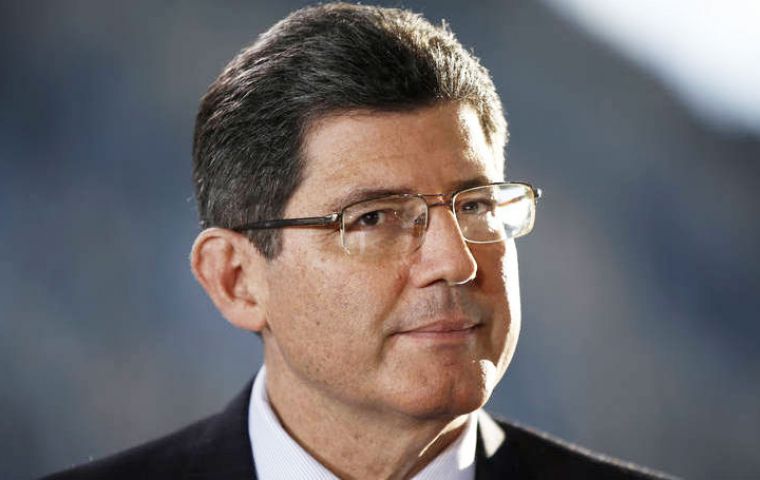MercoPress. South Atlantic News Agency
Brazil tells IMF it's working with Congress to restore fiscal balance and structural change
 “The current year is a transition year for the Brazilian economy, when we are committed to a swift reversal of the fiscal situation”, said Joaquim Levy
“The current year is a transition year for the Brazilian economy, when we are committed to a swift reversal of the fiscal situation”, said Joaquim Levy Brazil is working with Congress on a broad agenda of structural changes to improve the business climate, increase productivity and set price signals correctly to stimulate investment, announced Finance minister Joaquim Levy in his speech to the International Monetary and Financial Committee (IMFC) this weekend.
Levy added that since the last IMFC meeting (October 2014), Brazil has adopted a new set of policies to restore fiscal balance and prepare the economy for a new investment and growth cycle.
“These policies consider both the uncertain scenario for the global recovery, as well as the need to readjust fiscal policies and roll back countercyclical measures to cope with the end of the commodity cycle”, said Levy pointing out that “the current year is a transition year for the Brazilian economy, when we are committed to a swift reversal of the fiscal situation towards stable and eventually declining debt ratios”.
The Finance minister underlined that “fiscal balance is a necessary condition for growth resumption, but more needs to be done, hence economic and monetary authorities in Brazil are also working with Congress on a broad agenda of structural changes to improve the business climate, increase productivity and set price signals correctly to stimulate investment”.
Among the structural changes, Levy mentioned not only reform of the pension system and unemployment benefits and a reassessment of tax exemptions, but also a host of measures to instill new dynamics to the capital markets and foster long-term infrastructure investment.
The Brazilian official also anticipated that the fiscal and the structural growth agenda aim at “protecting the social gains of the last decade and strengthen the new middle class, offering social inclusion through new opportunities”.
Finally the minister said he was confident that given the diversity of the Brazilian labor force, the vigor of the Brazilian private sector and the soundness of Brazil’s financial system, we expect a relatively quick reallocation of resources and the recovery of growth, driven by growing exports, among other factors“.
In the presentation of his speech, Levy was rather optimistic regarding the global scenario outlook saying that despite prospects of a 'new mediocre' recovery, risks in the Euro area and US economies and even the possibility of a sharp slowdown in China ”have not materialized”.




Top Comments
Disclaimer & comment rules-

-

-

Read all commentsWorking with Congress?
Apr 20th, 2015 - 11:14 am 0How will that be possible when most of them will be banged up in jail for corruption?
A Military Dictatorship is needed to control the crooks and safeguard the country.
They could start by executing all the government.
Ha, ha, ha.
A dozen Pinochets it would take to install the shock. Here this smiling Jew says they can do it with more welfare and more dilma. Anyone else want to bet that CFK and Timerman don't come back from Russia? I know I could prove to be a fool next week, but any time they leave It's a possibility.
Apr 20th, 2015 - 08:04 pm 0Australia, like Brazil, is also dealing with the end of the commodity boom.
Apr 20th, 2015 - 10:27 pm 0Our growth has been affected.
Our unemployment has been affected.
Our government indebtedness has been affected.
And yet our growth has not turned negative.
Our unemployment has dropped.
Our government has less than half Brazil's debt.
I was also surprised to learn that during Brazil's recent high growth period, the second largest increase in immigrants were from Brazil. 12.5% per year between 2004-14.
Sure it will be the largest over the next decade.
Commenting for this story is now closed.
If you have a Facebook account, become a fan and comment on our Facebook Page!